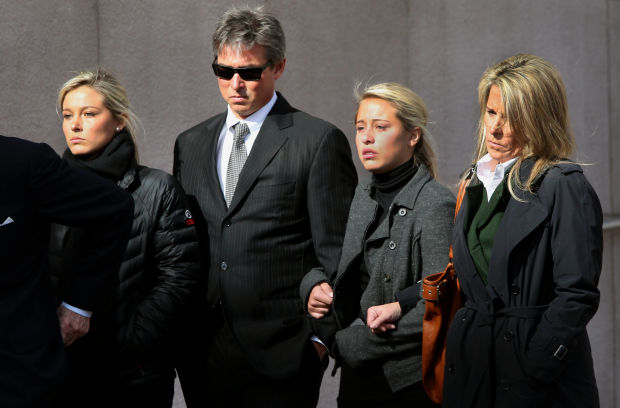National Prearranged Services Crooks Finally Get Prison Sentence
Six people who turned a prepaid funeral company into “an enormous Ponzi scheme” that cost victims more than $450 million were sentenced here Thursday to prison terms from 18 months to 10 years.
The owner of National Prearranged Services Inc., James “Doug” Cassity, 67, along with his son, Brent Cassity, 46, and former chief financial officer Randall K. Sutton, 68, all could have faced life terms under federal sentencing guidelines.
But they and two others struck plea deals in June and July that guaranteed less time in prison. As it was, the Cassitys, of Clayton, and Sutton, of Chesterfield, were sentenced to the top of the range specified in their agreements. Doug Cassity received nine years and seven months; Brent Cassity got five years; and Sutton got seven years.
A company lawyer, Howard Wittner, 76, of Chesterfield, faced up to five years and received three. Longtime employee Sharon Nekol Province, 69, of Ballwin, faced three years and got 18 months.
The only defendant to go to trial, former investment adviser David Wulf, 61, of St. Louis County, was convicted at trial in August on 18 counts, including bank fraud, wire fraud and conspiracy. Had he pleaded guilty, he would have faced five years or less. U.S. District Judge Jean Hamilton gave him 10 years.
Hamilton ordered the Cassitys, Sutton, Wulf and Province to pay restitution of $435 million, the balance of the loss after assets were forfeited. Wittner was ordered to repay $10.5 million. The prospect of significant repayments to the more than 97,000 victims appears remote. A civil suit is pending.
The losses fall upon funeral plan customers, funeral homes, insurers and financial institutions. Some testified at Thursday’s sentencing hearings — in a courtroom overflowing with victims, investigators, court staff and families and friends of the defendants.
Marty Meyers, of the Meyers Funeral Chapel in Blue Springs, Mo., walked slowly forward, pinning each defendant with an angry glare on the way. Meyers said the scam “devastated our family.” He explained that his funeral home was one of the most damaged, with losses of $3.2 million to $4 million. “All the partying and carrying on that they did … that was our money,” he said.
The Cassitys pleaded guilty to mail fraud, wire fraud, money laundering and other charges.
Sutton pleaded guilty to charges of bank fraud, mail fraud, money laundering and insurance fraud.
Wittner pleaded guilty to two counts of making false statements intended to deceive insurance regulators, and to willfully permitting a felon to engage in the insurance business. That refers to Doug Cassity’s past conviction for investment fraud. Wittner admitted lying to state regulators and concealing the source of money used to buy a medical malpractice insurer.
Province pleaded guilty to six counts of mail fraud, wire fraud and misappropriation of insurance premiums.
At times, the feeling in the courtroom was tense, with victims and defendants in close proximity.
Later in the series of hearings that stretched for more than three hours, a man sitting with the Cassitys turned to Meyers and used an expletive to demand that Meyers “shut your … mouth.” Some of the Cassitys’ relatives glared at Meyers as they left the courtroom later.
Federal prosecutors said that while the Clayton-based NPS was promising customers that the money they paid for prearranged funeral contracts would be held in trust, the cash was used for the personal enrichment of company officers and others. New contracts paid the expenses of the funerals that were supposed to have been paid from the trusts, officials said.
NPS collapsed in 2008.
State insurance guaranty associations will cover the face value of policies that were supposed to grow through investments to pay full funeral costs. Undertakers have told the Post-Dispatch that they will have to cover the difference and may lose money on each funeral.
Hamilton, the judge, called it “an enormous Ponzi scheme” executed for “over 15 years.”
Sybil Smith, special agent in charge of criminal investigation for the Internal Revenue Service, said in a prepared statement, “Honest and law-abiding citizens are fed up with the likes of those who use deceit and fraud to line their pockets with other people’s money.”
The FBI and the U.S. Postal Inspection Service also investigated the case, as did state regulators.
During Thursday’s hearings, defense lawyers argued for lighter sentences, many citing clients’ advanced age and health problems.
Scott Rosenblum, one of the lawyers representing Doug Cassity, said his client did not set out to “build a fraud,” but made business choices that were both wrong and fraudulent. He said that Cassity lost his house, his vehicle and now gets around by bicycle.
Sutton “deeply regrets” what he did, and lost track of the voice of his conscience, said his lawyer, Burt Shostak.
Wittner said he had no intention to harm anyone, and thought he was doing the right thing. Bill Lucco, one of his lawyers, pointed out that he admitted only two paperwork violations and the crime of allowing a felon to participate.
Lawyer Joseph Hogan said Wulf should not be punished for exercising his right to go to trial. Hogan argued for a sentence not much higher than the five years he gave up by not pleading guilty.
Assistant U.S. Attorney Charles Birmingham said that if Hamilton wanted to vary from the guidelines, prosecutors would seek to add 12 years.
Brent Cassity apologized, and lawyer Richard Sindel said that much of the illegal activity was directed by others.
Province’s lawyers argued that she was “at the very bottom level” of the scam. She does not have a high school diploma, attorney Diane Dragan said, and trusted her better-educated co-workers and their claims that the business practices had been approved.
She was installed as president of one of the insurance companies late in the life of the scam, by the Cassitys, Dragan said, and was president “in name only.”
[via: STLtoday.com]




